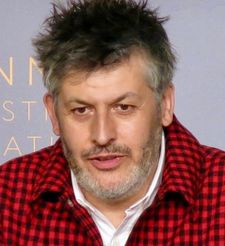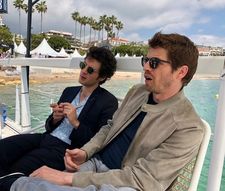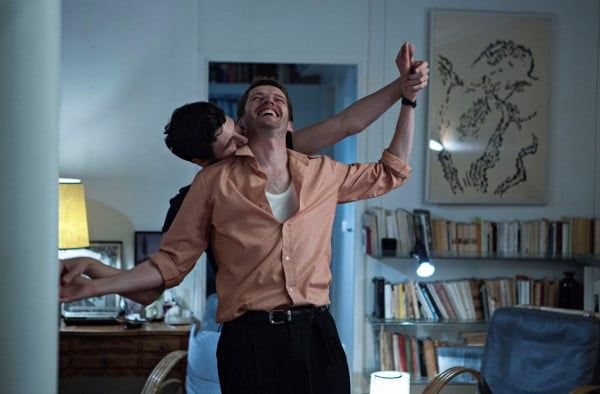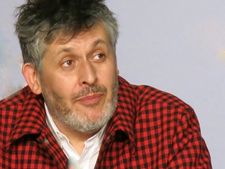Back at the Cannes Film Festival and only his second time in the Competition (last time in 2007, for Les Chansons d’Amour), French director Christophe Honoré has also played in the Directors’ Fortnight with Dans Paris (2006). His tenth feature Sorry Angel (Plaire, Aimer Et Courir Vite) sees Stranger By The Lake‘s Pierre Deladonchamps hook up with the younger Vincent Lacoste and and the older Denis Podalydès in a doomed love story set in the 90s in Paris and Rennes, where Honoré was a student. Relaxing under the high bright Riviera sun on a pier at the Majestic Hotel’s beach, the day after the film’s well-received bow, he talks about what he agrees is his most personal film to date - but not, he stresses, in a narcissistic way. He also spoke about the use of nudity in his film, appearing to take a sideswipe at one of the key love scenes in last year's Call Me By Your Name in the process.
Richard Mowe: Are there more personal elements in this film in any of the others?
 |
| Christophe Honoré: 'I impose on myself a discipline of sincerely and of honesty' Photo: Richard Mowe |
RM: So one of the characters was you at 20?
CH: In the Nineties, I was 20 years old and a student in Rennes. When we were location scouting I told the crew that I wanted to look up the place I lived as a student. Fortunately we were able to shoot in that apartment, which gave a great sense of proximity to who I was at that time.
RM: How did you go about the casting given that it was all so close to you?
CH: That did not really come into it. It is not narcissistic even though you try to remain as close to yourself as possible. I impose on myself a discipline of sincerely and of honesty. That is at the script-writing stage. When it comes to being the director and casting the film, I never thought about which young French actor looks most like I did way back then. I would never have come to Vincent Lacoste for the role in that way. I wanted someone who could be involved in this deeply melodramatic tale using happy moments - and he was perfect to find that tone.
RM: Do you accept and feel more comfortable with yourself today as you become older?
CH: It is always complicated when you are 40 or 50. You feel you are in touch with your memories as younger person. The difficulty is to see who I was at 20 and relating that to who I am now - it is about connecting the dots. I don’t want to sound pretentious but it is really about what Proust said in A la recherché du temps perdue - that there are strong moments of your past which can plunge you into strong emotion, but they are not interconnected. They remain autonomous.
 |
| Sorry Angel leads Pierre Deladonchamps (right) and Vincent Lacoste in full interview mode with Christophe Honoré on the Majestic Hotel beach pier. Photo: Richard Mowe |
RM: Last year, there was another film that touched on the same period - 120 Beats Per Minute by Robin Campillo. Were you aware of each other’s projects?
CH: I am not a close friend of Robin, although obviously we know of each other. I only saw Robin’s film after I had finished editing my own film. I can understand why people make comparisons or draw links between the two of them. Our intention was to go off in different directions. It is as if this is a watershed moment and we can now talk about those subjects. We were surrounded by people who would die of AIDS at that time. At first we thought that cinematically we had to pay tribute to people we had lost and only now have we felt capable of telling what the ravages of the AIDS epidemic meant to our generation.
RM: Robin Campillo has said that he feels guilty that he has survived. Do you feel the same way?
CH: I do understand what he means when says that, but he is around eight years older than I am. I started exploring my sexuality in the middle of the Eighties and I knew about AIDS through the big health campaign at the time. I knew the answer was to use condoms and there was no problem with that. But I know some people of an older generation were not so savvy or preferred to ignore the solution and take a chance. There was a certain amount of fatalism around. That also explains the different nature of our films. My film is about loving and how people loved in the Nineties whereas in Robin’s film it was more a dramatic tool.
RM: Why is love so complicated and full of obstacles?
RM: Regarding the nudity in the film, how did you decide what you would show and what you wouldn’t show?
CH: It is no longer possible to show two people in a film who experience deep desire for each other and show them in bed and making love and then pan to the widow. I think that is incredibly dishonest and hypocritical. There is another aspect - I don’t like scenes where you get a sense of performance and feel that actors are taking deep breathe before going in to these scenes and girding themselves up for the act. You feel the domination of the director over his cast. What I try to do is to discuss it with the actors beforehand. I learnt this on my second film with Isabelle Huppert, called My Mother, which is littered with sex scenes. Isabelle had the script and invited me over to her house to discuss them. A number of the scenes were very explicit and raw.
We read through it together and she simply asked me what I was going to show in each scene: whether it was her arm, her leg, or her tummy. I told her exactly what would be shown and she told me precisely what I could show and what she was comfortable with. I thought it was a really intelligent way of going about it and so we had a contract of what I was allowed to show and what I wasn’t. I used that same method working with Pierre and Vincent and they agreed I could show everything from behind and then restrictions on what is seen from the front. As for the other actor Denis Podalydes, he said he did not want to show anything and that is why he has underwear.
RM: Has the way we love today changed from the Nineties?
CH: The way we love evolves over time - the way we flirt and seduce and show desire and communicate. Jean-Luc Godard’s Pierrot Le Fou is a very good portrait of love in the Sixties and Jean Eustache’s The Mother And The Whore was fantastic portrait of love in the Seventies. I hope my film is an authentic portrait of love in the Nineties. There is a different way of speaking about love today, but I am not 20 so I am not as attentive to the way young people behave. I am not best placed to express that. In French cinema we are very bad at many things, but I think in terms of portraying romance and love we are very good at it. If you look at American rom-coms of the Fifties and the same films today it seems very little has changed and frankly that is dishonest.























